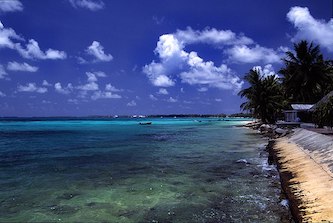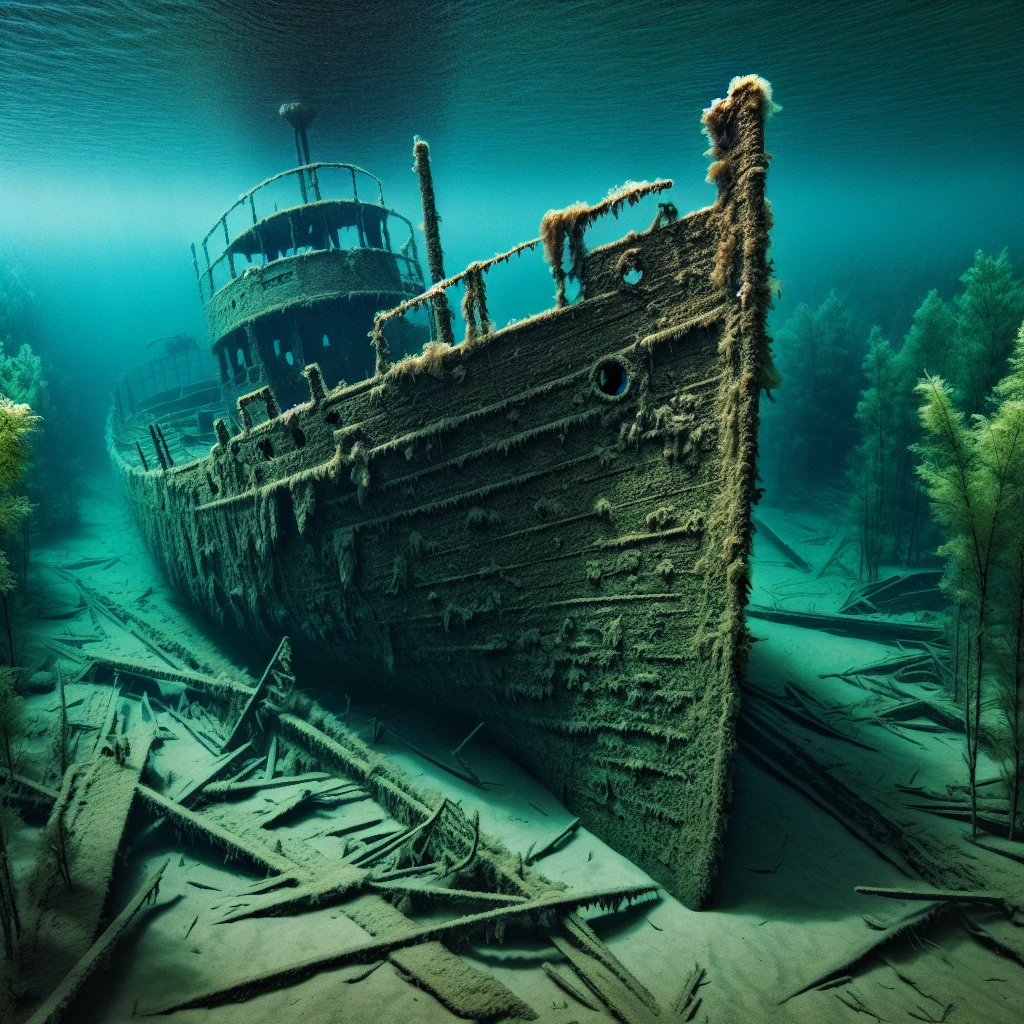Australia and Tuvalu, a small Pacific nation, have made a big agreement. The deal allows up to 280 people from Tuvalu to live, work, and study in Australia each year. This is the first time Australia has offered residency to people from another country because of climate change. The agreement, called the Falepili Union, is a big deal for both countries. It also means Australia will help Tuvalu with climate action and security.
Australia has promised to give money to help Tuvalu deal with climate change. This includes helping to make the main island bigger. The agreement also says Australia will protect Tuvalu from military attacks. In return, Tuvalu won’t make defense deals with other countries without Australia’s permission. New Zealand and the US have similar deals with other Pacific nations.
Tuvalu is a small country with 11,200 people. It’s been trying to deal with the problem of rising seas. The country is taking steps to make sure it stays a country, even if it loses land because of climate change. In January, Tuvalu said it plans to make a digital version of itself in the metaverse to keep its history and culture safe.
The Australian Prime Minister said the agreement is “ground-breaking.” The Tuvalu Prime Minister called it “a beacon of hope.” The deal is a big step in making sure the region stays stable, sustainable, and prosperous. It’s also a big deal because it shows that bigger countries have a responsibility to help those who are most affected by climate change.
Original news source: Australia offers climate refuge to Tuvalu citizens (BBC)
Listen
Slow
Normal
Fast
Group or Classroom Activities
Warm-up Activities:
– News Summary
Instructions: Students will be divided into small groups. Each group will read the article and then work together to create a brief news summary of the main points in their own words. They will have 10 minutes to prepare, and then each group will present their summary to the class.
– Opinion Poll
Instructions: Write a series of statements about the article on the board (e.g., “Climate change is the most important issue facing Pacific nations today,” “Larger countries have a responsibility to help smaller nations affected by climate change”). Students will stand in a line according to how strongly they agree or disagree with each statement. Afterwards, have a class discussion where students explain their positions.
– Future Predictions
Instructions: After discussing the article, ask students to write down their predictions on how the relationship between Australia and Tuvalu will evolve in the next 10 years as a result of this agreement. They should consider the potential impacts on immigration, climate action, and regional security. Students can share their predictions with the class and debate the likelihood of each scenario.
– Keyword Hangman
Instructions: Play a game of hangman using key vocabulary from the article (e.g., “residency,” “climate change,” “metaverse,” “sustainable”). This will serve as a fun way to review and reinforce new words from the text. Split the class into two teams and alternate turns, with each correct letter earning a point for the team.
– Think-Pair-Share
Instructions: Pose a question related to the article for the students to think about individually, such as “What are the potential pros and cons of the Falepili Union agreement for Tuvalu and Australia?” After a few minutes of individual reflection, students will pair up to discuss their thoughts. Finally, pairs will share their insights with the entire class, fostering a group discussion on the topic.
Comprehension Questions:
1. What is the name of the agreement between Australia and Tuvalu?
2. How many people from Tuvalu are allowed to live, work, and study in Australia each year under this agreement?
3. For what reason has Australia offered residency to people from Tuvalu?
4. What kind of support will Australia provide to Tuvalu as part of the Falepili Union?
5. What has Australia promised to do to help Tuvalu’s main island?
6. What condition has Tuvalu agreed to regarding defense deals with other countries?
7. What unique solution is Tuvalu exploring to preserve its history and culture?
8. How did the Prime Ministers of Australia and Tuvalu describe the agreement?
Go to answers ⇩
Listen and Fill in the Gaps:
Australia and Tuvalu, a small (1)______ nation, have made a big agreement. The deal allows up to 280 (2)______ from Tuvalu to live, work, and study in Australia each year. This is the first time Australia has offered (3)______ to people from another country because of climate change. The agreement, called the (4)______ Union, is a big deal for both countries. It also means Australia will help Tuvalu with climate action and security.
Australia has promised to give (5)______ to help Tuvalu deal with climate change. This (6)______ helping to make the main island bigger. The agreement also says Australia will protect Tuvalu from military attacks. In return, Tuvalu won’t make (7)______ deals with other (8)______ without Australia’s permission. New Zealand and the US have (9)______ deals with other Pacific nations.
Tuvalu is a small country with 11,200 people. It’s been trying to deal with the problem of rising seas. The country is taking (10)______ to make sure it stays a country, even if it loses land because of (11)______ change. In (12)______, Tuvalu said it plans to make a digital version of itself in the metaverse to keep its history and culture safe.
The Australian Prime Minister said the agreement is “ground-breaking.” The (13)______ Prime Minister called it “a (14)______ of hope.” The deal is a big step in making sure the (15)______ stays stable, (16)______, and prosperous. It’s also a big deal because it shows that bigger countries have a responsibility to help those who are most affected by climate change.
Go to answers ⇩
Discussion Questions:
Students can ask a partner these questions, or discuss them as a group.
1. What is climate change, and why do you think it’s a problem for some countries?
2. How would you feel if you had to move to another country because of climate change?
3. Do you like the idea of countries helping each other when they face big problems? Why or why not?
4. Do you think it’s fair for one country to ask permission from another before making defense deals? Why?
5. What is a “digital version” of a country, and how do you think it could help preserve history and culture?
6. Have you ever heard of the metaverse? What do you think it’s for?
7. If your country was affected by climate change, would you prefer to move to another country or stay and face the challenges? Why?
8. How important do you think it is for bigger countries to take responsibility for climate change? Why?
9. What does the term “ground-breaking” mean to you, and can you think of any ground-breaking agreements or inventions?
10. What is a “beacon of hope,” and have you ever experienced something that gave you hope during tough times?
11. Do you think studying abroad is a good opportunity? Why or why not?
12. How can making an island bigger help with climate change problems, in your opinion?
13. What kind of climate action do you think is most effective?
14. Can you imagine what life might be like for people from Tuvalu moving to Australia? How might it be different from their home?
15. What does a sustainable and prosperous region look like to you?
Individual Activities
Vocabulary Meanings:
Match each word to its meaning.
Words:
1. agreement
2. residency
3. climate
4. security
5. defense
6. metaverse
7. stable
8. prosperous
Meanings:
(a) The right to live in a place
(b) Protection from attacks or threats
(c) A promise between two or more parties
(d) Successful and thriving
(e) Not likely to change or fail
(f) A virtual reality space created by the internet
(g) The long-term weather patterns of a place
(h) Protection from danger or harm
Go to answers ⇩
Multiple Choice Questions:
1. What is the name of the agreement between Australia and Tuvalu?
(a) Pacific Alliance
(b) Falepili Union
(c) Climate Accord
(d) Island Partnership
2. How many people from Tuvalu are allowed to live, work, and study in Australia each year under the agreement?
(a) Up to 150
(b) Up to 400
(c) Up to 500
(d) Up to 280
3. What is one thing Australia has promised to help Tuvalu with?
(a) Building more houses
(b) Improving healthcare
(c) Dealing with climate change
(d) Developing new technology
4. What is Tuvalu planning to do in the metaverse to preserve its history and culture?
(a) Create a virtual reality game
(b) Make a digital version of itself
(c) Start a social media campaign
(d) Build a new museum
5. How many people live in Tuvalu?
(a) 11,200
(b) 20,000
(c) 8,500
(d) 15,700
6. What did the Australian Prime Minister call the agreement?
(a) “Ground-breaking”
(b) “Historic”
(c) “Life-changing”
(d) “Revolutionary”
7. What is the main goal of the agreement between Australia and Tuvalu?
(a) To increase military presence in the Pacific
(b) To limit immigration from Tuvalu
(c) To ensure the region stays stable, sustainable, and prosperous
(d) To exploit Tuvalu’s natural resources
8. What does the article suggest about the responsibility of bigger countries in relation to climate change?
(a) They should focus on their own problems first
(b) They have no responsibility to help other countries
(c) They should only help if it benefits them economically
(d) They have a responsibility to help those most affected
Go to answers ⇩
True or False Questions:
1. The agreement is called the Falepili Union and includes Australia helping Tuvalu with climate action and security.
2. The agreement does not include Australia protecting Tuvalu from military attacks and Tuvalu making defense deals with other countries without Australia’s permission.
3. The agreement is seen as “ground-breaking” by the Australian Prime Minister and “a beacon of hope” by the Tuvalu Prime Minister, and it shows that bigger countries have a responsibility to help those most affected by climate change.
4. Tuvalu is a large country with 11,200 people and is not trying to deal with the problem of rising seas.
5. In January, Tuvalu announced plans to make a digital version of itself in the metaverse to keep its history and culture safe.
6. Australia has not promised to give money to help Tuvalu deal with climate change or make the main island bigger.
7. This is not the first time Australia has offered residency to people from another country because of climate change.
8. Australia and Tuvalu have made an agreement allowing up to 280 people from Tuvalu to live, work, and study in Australia each year.
Go to answers ⇩
Write a Summary:
Write a summary of this news article in two sentences.
Check your writing now with the best free AI for English writing!
Writing Questions:
Answer the following questions. Write as much as you can for each answer.
Check your answers with our free English writing assistant!
1. What is the purpose of the Falepili Union agreement between Australia and Tuvalu?
2. How many people from Tuvalu are allowed to live, work, and study in Australia each year under the new deal?
3. What kind of assistance is Australia providing to Tuvalu to combat climate change?
4. Why is Tuvalu creating a digital version of itself in the metaverse?
5. How did the Prime Ministers of Australia and Tuvalu describe the new agreement, and why is it considered significant?
Answers
Comprehension Question Answers:
1. What is the name of the agreement between Australia and Tuvalu?
The agreement is called the Falepili Union.
2. How many people from Tuvalu are allowed to live, work, and study in Australia each year under this agreement?
Up to 280 people from Tuvalu can live, work, and study in Australia each year.
3. For what reason has Australia offered residency to people from Tuvalu?
Australia has offered residency to people from Tuvalu because of climate change.
4. What kind of support will Australia provide to Tuvalu as part of the Falepili Union?
Australia will help Tuvalu with climate action, security, and making the main island bigger.
5. What has Australia promised to do to help Tuvalu’s main island?
Australia has promised to give money to help make the main island of Tuvalu bigger.
6. What condition has Tuvalu agreed to regarding defense deals with other countries?
Tuvalu has agreed not to make defense deals with other countries without Australia’s permission.
7. What unique solution is Tuvalu exploring to preserve its history and culture?
Tuvalu is planning to create a digital version of itself in the metaverse to preserve its history and culture.
8. How did the Prime Ministers of Australia and Tuvalu describe the agreement?
The Australian Prime Minister called it “ground-breaking,” and the Tuvalu Prime Minister called it “a beacon of hope.”
Go back to questions ⇧
Listen and Fill in the Gaps Answers:
(1) Pacific
(2) people
(3) residency
(4) Falepili
(5) money
(6) includes
(7) defense
(8) countries
(9) similar
(10) steps
(11) climate
(12) January
(13) Tuvalu
(14) beacon
(15) region
(16) sustainable
Go back to questions ⇧
Vocabulary Meanings Answers:
1. agreement
Answer: (c) A promise between two or more parties
2. residency
Answer: (a) The right to live in a place
3. climate
Answer: (g) The long-term weather patterns of a place
4. security
Answer: (h) Protection from danger or harm
5. defense
Answer: (b) Protection from attacks or threats
6. metaverse
Answer: (f) A virtual reality space created by the internet
7. stable
Answer: (e) Not likely to change or fail
8. prosperous
Answer: (d) Successful and thriving
Go back to questions ⇧
Multiple Choice Answers:
1. What is the name of the agreement between Australia and Tuvalu?
Answer: (b) Falepili Union
2. How many people from Tuvalu are allowed to live, work, and study in Australia each year under the agreement?
Answer: (d) Up to 280
3. What is one thing Australia has promised to help Tuvalu with?
Answer: (c) Dealing with climate change
4. What is Tuvalu planning to do in the metaverse to preserve its history and culture?
Answer: (b) Make a digital version of itself
5. How many people live in Tuvalu?
Answer: (a) 11,200
6. What did the Australian Prime Minister call the agreement?
Answer: (a) “Ground-breaking”
7. What is the main goal of the agreement between Australia and Tuvalu?
Answer: (c) To ensure the region stays stable, sustainable, and prosperous
8. What does the article suggest about the responsibility of bigger countries in relation to climate change?
Answer: (d) They have a responsibility to help those most affected
Go back to questions ⇧
True or False Answers:
1. The agreement is called the Falepili Union and includes Australia helping Tuvalu with climate action and security. (Answer: True)
2. The agreement does not include Australia protecting Tuvalu from military attacks and Tuvalu making defense deals with other countries without Australia’s permission. (Answer: False)
3. The agreement is seen as “ground-breaking” by the Australian Prime Minister and “a beacon of hope” by the Tuvalu Prime Minister, and it shows that bigger countries have a responsibility to help those most affected by climate change. (Answer: True)
4. Tuvalu is a large country with 11,200 people and is not trying to deal with the problem of rising seas. (Answer: False)
5. In January, Tuvalu announced plans to make a digital version of itself in the metaverse to keep its history and culture safe. (Answer: True)
6. Australia has not promised to give money to help Tuvalu deal with climate change or make the main island bigger. (Answer: False)
7. This is not the first time Australia has offered residency to people from another country because of climate change. (Answer: False)
8. Australia and Tuvalu have made an agreement allowing up to 280 people from Tuvalu to live, work, and study in Australia each year. (Answer: True)
Go back to questions ⇧















